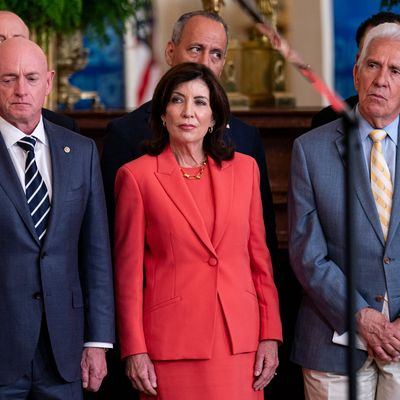

From left: Senator Mark Kelly, Governor Kathy Hochul, and Representative Jim Costa.
Photo: Al Drago/Bloomberg via Getty Images
After a yearslong fight, the path toward congestion pricing in New York City finally seemed clear. The federal government had given its final approval. The city had painstakingly come up with exemptions for certain groups. The June 30 start date was set despite pending lawsuits, including from New Jersey governor Phil Murphy. The first-in-the-nation plan, officially known as the Central Business District Tolling Program, would charge a $15 toll on most cars traveling in Manhattan at or below 60th Street in an effort to decrease congestion while raising funds for MTA transit improvements.
But on Tuesday, Politico and the New York Times reported that Governor Kathy Hochul was suddenly mulling a delay of the pioneering program. And on Wednesday, she pulled the plug, announcing that she had ordered the MTA to pause implementation indefinitely. “After careful consideration, I have come to the difficult decision that implementing the planned congestion-pricing system risks too many unintended consequences for New Yorkers at this time,” Hochul said in a pretaped address.
Hochul had been a consistent advocate for congestion pricing. At a June 2023 event, she said, “We are setting the standard right here in real time for how we can achieve cleaner air, safer streets, and better transit.” On Wednesday, Hochul sang a different tune. In her remarks, the governor cited many of the same arguments that have been raised over the years by critics of the program, arguing that it would discourage travel and tourism and that the toll would be an undue burden on many New Yorkers. “Let’s be real. A $15 charge may not seem like a lot to someone who has the means. But it can break the budget of a hard-working or middle-class household,” she said.
The shift from Hochul appeared strikingly new. She was touting the program as recently as May 20 during her keynote speech at the Global Economic Summit. “In New York City, the idea stalled for 60 years until we got it done earlier this year,” she said at the time. “It took a long time because people feared backlash from drivers set in their ways. But much like with housing, if we’re serious about making cities more livable, we must get over that.”
The odd timing has prompted speculation that Hochul is delaying congestion pricing as an electoral tactic. New York’s bevy of competitive House races, which are concentrated in Westchester and on Long Island, could tip the scales in terms of party control of the U.S. House of Representatives, and Politico reported that House Minority Leader Hakeem Jeffries had raised concerns about the impact congestion pricing could have on some of those races. However, State Senator Liz Krueger told the Times, “I do not believe this would impact the elections.”
Democratic representative Jerry Nadler, who has supported congestion pricing, said he was disappointed by the news. “After years of delays, we need congestion pricing now more than ever to reduce paralyzing vehicle traffic in the Central Business District, improve air quality in our city and region, and raise desperately needed capital funds to enhance the public transit system that millions depend on,” he said in a statement.
Democratic representative Ritchie Torres also raised questions about what the shift would mean for the MTA. “The central concern is not so much congestion pricing as it is the preservation of a public transit system that is too big to fail. Make no mistake: without the funding it needs, the MTA will fail and New York will become a shadow of its former self,” he said on X.
Predictably, another group of New York politicians was more pleased. In a statement, moderate Democratic congressman Pat Ryan said he was “proud to say we’ve stopped congestion pricing in its tracks.” Elise Stefanik, the House Republican Caucus chair, called the move a “HUGE victory for hardworking New Yorkers.”
In her remarks announcing the pause, Hochul seemed to anticipate some of the backlash that she would receive for her decision. “To those cynics who question my motivation, I approach every decision through one lens: What is best for New Yorkers,” she said.
Source link




